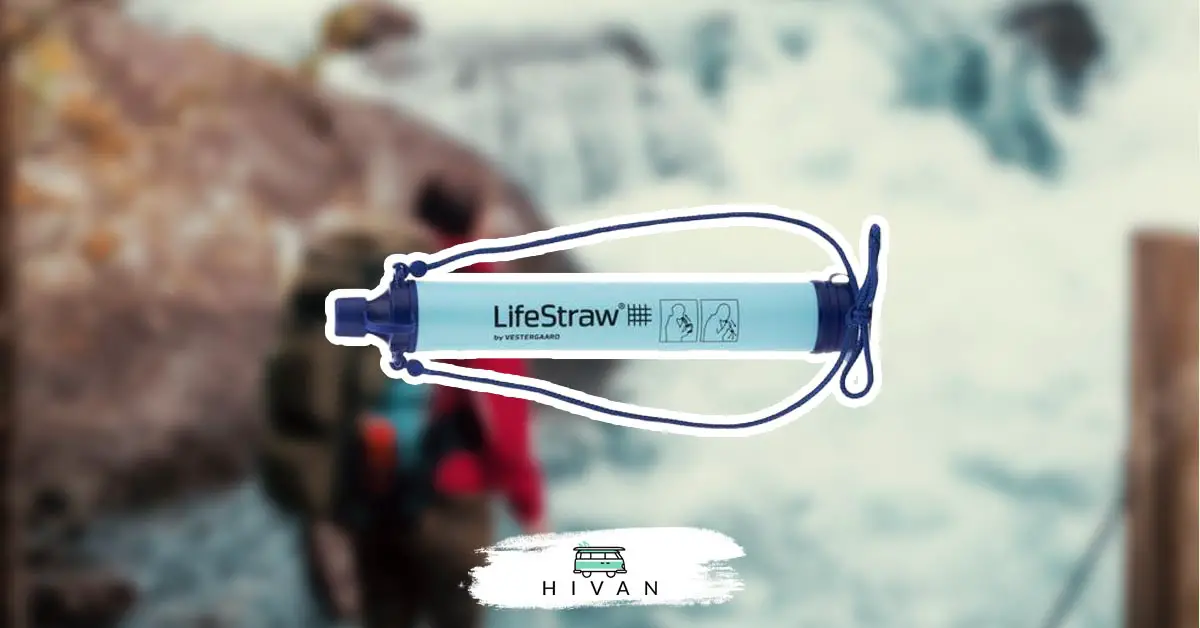Hi-van is supported by its audience. When you purchase using our links, we may earn an affiliate commission (no added cost to you). Learn more
When traversing the backcountry, it’s super important to filter the water before consumption, or else you can end up seriously ill. As such, you should always make sure that your backpacking water filter is working properly before heading out – especially if it’s old and used.

Backpacking water filters do expire and lose their effectiveness over time. Every water filter comes with an estimated lifespan telling you how much water it can filter. However, if you use it to filter a lot of filthy water, you’ll get a much shorter lifespan than what’s advertised.
In this article, I’ll give you a rough idea of how long a backpacking water filter lasts and how to extend its lifespan. Moving on, I’ve also listed some warning signs suggesting the water filter is nearing its end and that you should get it replaced.
How Long Backpacking Water Filters Last
The lifespan of a backpacking water filter is measured in terms of how much water it can filter.
Lightweight, easy to use portable water filter removes harmful bacteria, protozoa, cysts, sediment, and 100% of microplastics; Perfect for outdoor adventures, travel, or emergency preparedness.
For example a water filter such as the Sawyer Products Water Filtration System (available on Amazon.com) has an advertised lifespan of up to 100,000 gallons (378,541.18 L) with proper use and maintenance.
Removes bacteria & parasites: The microfiltration membrane removes 99.999999% of waterborne bacteria (including E. coli and salmonella) and 99.999% of waterborne parasites (including giardia and cryptosporidium)
However, the LifeStraw Water Filter (available on Amazon.com) only promises up to 1,000 gallons (3,785.41 L).
But how does this translate in reference to time?
Well, let’s assume your backpacking water filter has a humble lifespan of 500 gallons (1,892.71 L). Now, say you go on ten hiking/campaign trips per year, and in each trip, you filter ten gallons (37.85 L) of water for yourself. In that case, your water filter will easily last you five years.
However, such a long lifespan is only possible if you properly maintain your water filter. For example, accidental damage from drops or bumps can create cracks in the filter, rendering it useless. Likewise, if you don’t clean the filter after use, its insides will clog up, reducing its lifespan.
Related Article: Does LifeStraw Filter Out Viruses?
How To Increase the Life of a Water Filter
Properly taking care of your backpacking water filter can increase its lifespan by a couple of years. Here are some tips you can follow to get the most out of your water filter:
- Follow the manufacturer’s maintenance guidelines. Different water filters use different filtration systems. As such, make sure you follow the instructions provided by the manufacturer when using, cleaning, and storing it for maximum lifespan.
- Don’t let it freeze. Even if there’s a trace amount of water inside the filter and it freezes, the water will expand. This will break the internal filtration system, rendering it incapable of adequately filtering water.
- Don’t let it fall or suffer a strong impact. Falls and bumps can create cracks allowing unfiltered water to pass through.
- Pre-filter the water before passing it through. Use a cloth to remove dirt or small debris that can clog up the water filter.
- Backwash it after use. Immediately backwashing will eliminate small debris or dirt stuck in the filtering material that could’ve clogged it up.
- Sanitize it (unless not recommended by the manufacturer) before storing it away. Use a diluted bleach solution to wash the filter before putting it away. Sanitizing kills off any microorganisms attached to it.
To know more about backwashing, watch this YouTube video:
When Is It Time To Replace the Water Filter?
As you keep using your water filter, its efficiency will gradually decrease. Taking too long to filter water is the biggest telltale sign that your water filter is nearing its end. However, there are many more things you should keep an eye out for to ensure your water filter is performing optimally.
It’s time to replace your water filter if you notice any of these five signs:
- Filtering the water takes too long, even after a backwash.
- You can see visible cracks where water is seeping out.
- The filter is/was frozen.
- You find mold growing on a stored water filter.
- Recently, filtered water tastes funny (earthy or metallic.
Do Unused Backpacking Water Filters Expire?
There’s no expiry date for backpacking water filters. They expire when their filtration system isn’t able to filter water adequately. As such, an unused backpacking water filter shouldn’t expire. Right?
Unused backpacking water filters won’t expire if you store them properly. However, it can degrade if stored in a warm and humid environment that promotes bacterial growth. Other than this, accidental drops or bumps can fracture the internal filtration system, making it unusable.
So, even if you’re not using the water filter, you should still take care of it. Follow the manufacturer’s guidelines on how to store it to get the maximum lifespan.
Can Bacteria Grow in Used Backpacking Water Filters?
You use your backpacking water filter to get rid of bacteria and protozoa from your water. But what if your water filter is responsible for sending bacteria into your filtered water?
Bacteria can grow in some backpacking water filters if they’re not sanitized after use. During filtering, the microorganisms can get stuck inside the filtration system. If you don’t treat it, the bacteria can breed and grow inside the filter – especially if you store it in a warm and humid place.
Using a filter that’s become a breeding ground for bacteria is a bad idea. The bacteria can reach your filtered drinking water, making you sick. As such, you should always clean and sanitize your water filter before storing it away after a trip.
Important: Not all backpacking water filters can or need to be cleaned and sanitized. Refer to its manual to learn the recommended way to maintain it.
Key Takeaways
Backpacking water filters are rated to filter a certain amount of water, after which it’ll expire or cease to work. However, its specific lifespan depends on the type of filtration system it uses and how well you maintain it.
The biggest reason hikers need to replace their water filters frequently is because of cracks or fractures in the filtration system. This can happen due to accidental drops, bumps, or getting frozen.
If you properly take care of your backpacking water filter and follow the manufacturer’s guidelines, it should easily last you for five or more years.
Find this content useful 🙂 ?
Subscribe to our Newsletter and get a free Solar Electric Diagram + shopping list.



